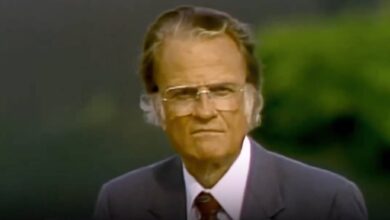Died: Timothy Dudley-Smith, Who Turned Metrical Poetry int…… | News & Reporting

Timothy Dudley-Smith, author of “Tell Out, My Soul,” “Lord, for the Years,” “Sing a New Song,” and more than 400 other hymns, died in Cambridge, England, on August 12. He was 97.
Dudley-Smith was a Church of England bishop, serving as the suffragan, or assistant bishop, of Thetford in Norwich for 12 years before he retired in 1991. Prior to taking a position in leadership, he served as director of the Church Pastoral Aid Society.
He was always more widely known, however, for his hymns. Many Anglicans deeply cherished his words.
“These hymns restore our faith, not only in the gospel, but also in the action of singing that gospel together, with heart, and soul, and voice,” a retired English professor at the University of Durham wrote in 2006. “Dudley-Smith never lets us down. There are no weak lines, no approximate rhymes, no distortions of syntax, no fumbled metres … no bad hymns.”
Dudley-Smith’s most popular hymn, “Tell Out, My Soul,” has been published 190 times in Great Britain and is also popular in the US and elsewhere. It was first written in 1961, and by 1985, appeared in 42 percent of all contemporary hymnals, according to hymnary.org.
Ten of Dudley-Smith’s other songs have been published more than two dozen times. “Faithful Vigil Ended”—“Faithful vigil ended / watching waiting cease / Master, grant thy servant / his discharge in peace”—has appeared in 28 different hymnals. “Name of All Majesty,” written in 1979, appears in more than 70, including translations in French, Korean, and Chinese.
Dudley-Smith was a committed evangelical and identified with evangelicalism from childhood. But his work was embraced across party lines in the Church of England.
Ian Bradley, a church historian, hymnal editor, and BBC journalist, wrote that Dudley-Smith represented “a very orthodox Anglican tradition of hymn writing” and was “unashamedly evangelical.” At the same time, his work was seen as “very English,” according to Bradley, and somehow “broad enough to encompass Noël Coward, W. S. Gilbert, Stephen Sondheim, and Shakespeare, as well as J. I. Packer and Martyn Lloyd-Jones.”
Dudley-Smith, for his part, was often very modest about his hymns. He frequently noted he wasn’t actually musical and didn’t write any of the music, just the metrical poetry that could be put to various singable melodies. He titled his 2017 book on hymn writing A Functional Art.
“Not all our hymn texts will be, or even should be, Rolls-Royces,” Dudley-Smith wrote, “but they should all be decently roadworthy, and as true to Scripture, as free from blemish, as carefully constructed, as appealing to the imagination, heart, and will, and as user-friendly as we can make them.”
Dudley-Smith was born to parents Phyllis and Arthur in Manchester on December 26, 1926—Boxing Day. His father was a schoolteacher who frequently read poetry to his children, often putting them to bed with verses from A. E. Housman, Walter de la Mare, and Alfred Tennyson:
Tho’ much is taken, much abides; and tho’
We are not now that strength which in old days
Moved earth and heaven, that which we are, we are;
One equal temper of heroic hearts,
Made weak by time and fate, but strong in will
To Strive, to seek, to find, and not to yeild
That trinity of Victorian poets came to be his favorites, followed by 20th-century British figures such as T. S. Eliot, Philip Larkin, and John Betjeman.
When Dudley-Smith was 11, his father died. He later recalled that was a pivotal moment for his faith.
“I had prayed when I knew he was ill, and you might think that my prayers not altering the situation would have put me off,” he said in an interview. “But it didn’t. It introduced me to my need of a heavenly Father.”
Around the same time, Dudley-Smith decided he wanted to be a minister.
“Someone at a family tea party said to me (as they did in those days), ‘What are you going to be when you grow up?’ I found myself replying, ‘I’m going to be a parson.’ It just came out. It was the first I knew of it myself!” he said.
Dudley-Smith was active in Scripture Union and learned the Bible in the group’s children’s programs. His faith deepened at a boys’ summer camp run by the conservative evangelical Church of England cleric E. J. H. Nash.
When he went to Cambridge, he considered pursing an education in math and education, like his late father, but ultimately decided on theology. He studied at Pembroke College and then did ordination training at Ridely Hall, both in Cambridge.
Dudley-Smith was ordained as a deacon in 1950 and a priest in ’51. His bishop—a former Olympic athlete and rugby player known as “the flying curate”—supported evangelist Billy Graham’s trip to England in 1954 and encouraged Dudley-Smith to get involved. The young minister helped ferry droves of schoolboys to the north London racetrack where Graham preached for four weeks, and then, responding to popular demand, extended his stay for two additional months.
The following year, Dudley-Smith joined the staff of the Evangelical Alliance and became editor of the organization’s magazine, Crusade.
His journalism won accolades from the priest in charge of religious broadcasting for BBC. The magazine was “something distinctly new in religious journalism in Britain. It was a glossy magazine … it had cartoons and a sense of humour, and it mixed devotional material with commentary on world events and—its editor’s trademark innovation—serious poetry.”
Dudley-Smith’s love of poetry was well-known by colleagues, and he also wrote his own verse. He had thought of trying to write songs but dismissed the possibility.
“I am totally unmusical!” he said. “I can’t sing in tune and often change key without knowing it.”
In the early 1960s, however, a priest working on the new Anglican Hymnbook approached him and asked if he wrote hymns. When he said no, the priest said, “Have you written any verse that might make a hymn?” And the answer to that was yes.
Dudley-Smith had been assigning someone to review the New English Bible for the Crusade and happened to look at Mary’s song of praise, the Magnificat, in Luke 1.
“Their version of Mary’s song begins, ‘Tell out, my soul, the greatness of the Lord,’” Dudley-Smith later recalled. “I said to myself, ‘That’s verse,’ and wrote up four short verses.”
It became his first and most popular hymn:
Tell out, my soul, the greatness of the Lord!
Unnumbered blessings, give my spirit voice;
tender to me the promise of his word;
in God my Saviour shall my heart rejoice.
The hymnal editors, however, first set it to a tune that didn’t work. At a conference of 600 clergy working through the songs, people actually quit singing it halfway through. Then the words were set to Woodlands, a tune composed in the early 1900s, and that worked. The hymn was well received and came to be widely sung.
The poet Betjeman said it was “one of the few modern hymns that will truly last.”
The editors of the new Anglican Hymnbook suggested more religious themes that Dudley-Smith could write on, and he made hymn writing a regular part of his life and ministry. He published a volume of his hymns in 1966 and another in ’69. Together, they sold more than one million copies.
His prodigious output drew comparisons to Isaac Watts and Charles Wesley, and some contemporaries hailed him as the greatest evangelical hymn writer of his day.
Dudley-Smith’s daughter Caroline Gill recalls he would write most of the hymns while on holiday in Cornwall.
“My father would rise early to pore prayerfully over his Bible and write in his manuscript book, which contained snatches of text that had accrued during the year, ready to be honed into hymns,” Gill wrote. “My father occasionally worked on a text at the beach, between a pasty lunch and an afternoon surf.”
Though he wrote a lot, it didn’t always flow. He wanted his hymns to be simple and deep, heartfelt and clear, biblical but uncontroversial. Too much repetition would make him cringe, and he also recoiled from approximate rhymes, like sin and king. He described his process as slow, careful, and laborious.
“I find you have to be prepared for two lines from a couple of hours’ work,” he once said, “and on subsequent review to scrap them.”
The work was worth it, though, because of the impact the hymns had on people’s lives.
“Many people learn more theology from hymns than from anywhere else,” Dudley-Smith said. “They provide a corporate participation in a unique way, enabling an expression of praise, penitence, commitment, and a whole range of things together. Also, I think, for many people, the hymn offers the chance to express emotions which are in their hearts, but which they would find difficulty in articulating themselves.”
Dudley-Smith’s second-most popular hymn, “Lore, for the Years,” became popular at Church of England New Year’s services and anniversaries. It was also used to solemnize national religious ceremonies in the UK, including the enthronement of the Anglican archbishop in 1991 and Queen Elizabeth II’s Golden Jubilee in 2002.
He was made an officer of the Most Excellent Order of the British Empire—several ranks below a knighthood—in 2003 for his “services to hymnody.”
Dudley-Smith also wrote an authorized two-volume biography of evangelical leader John Stott, who was a personal friend. Vol. 1 was titled John Stott: The Making of a Leader; Vol. 2, John Stott: A Global Ministry. He edited an anthology of Charles Wesley’s hymns and a collection of English hymns, and continued writing his own hymns into retirement.
“Hymn writing has been for me a most enriching and entirely unexpected gift,” he said.
He called it “the best of all trades.”
Dudley-Smith’s wife, June Arlette MacDonald, died in 2007 after 48 years of marriage. He is survived by daughters Caroline Gill and Sarah Walter and son James Dudley-Smith, who followed him into ministry in the Church of England.




